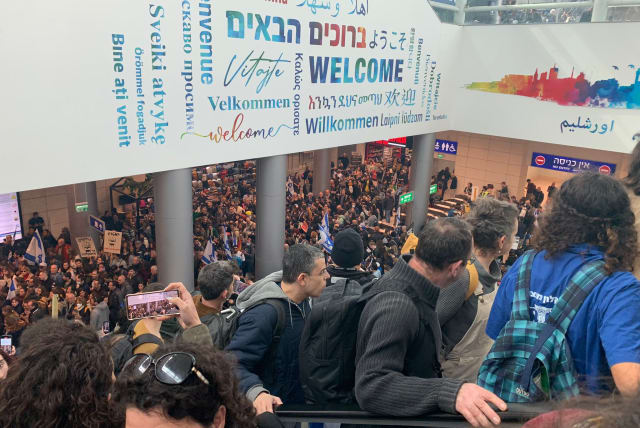Miri Regev must not roadblock Israel's transportation needs - editorial

Israelis on the streets feel like they have been continuously abandoned by their government, and this week was just the cherry on top.
Israel’s public transportation system is not exactly the easiest to navigate – and it becomes even more challenging when the slightest complication occurs.
Alongside the massive concern over public safety surrounding buses and trains is the simple incompetence seen when public transportation systems are faced with unexpected delays – and sometimes even expected ones. Just this past week on Thursday, for example, trains were stopped throughout central Israel for hours on end due to a massive power outage seemingly caused by routine maintenance work, something that could have been known in advance.
These are the simplest things that you would expect Israel’s transportation systems to prepare for, but that’s simply not the case.
The Jerusalem judicial reform protest transportation debacle
The clearest instance of such a situation was this past Monday, when hundreds of thousands of Israelis nationwide took to bridges, junctions and other locations to demonstrate against the proposed judicial reforms to Israel’s legal system. The event was organized well in advance, in particular the gathering in Jerusalem as part of the protests, which saw the number of demonstrators exceeding 90,000 – and, according to organizers, closer to 300,000.
The event was discussed in advance with the relevant authorities. Beyond Israel Police and bureaucratic arrangements, officials from the country’s major public transportation companies contacted Transportation Minister Miri Regev (Likud) one day prior to the demonstrations and warned her that massive crowds are expected to take public transportation to the event. Despite this, Regev made it clear that no reinforcement would be provided to the transportation system in and towards Jerusalem, including trains and buses.
This was despite standard practice that when there are particularly large events such as the demonstration on Monday, public transportation is reinforced for the safety and comfort of all those involved, protesters and local residents alike. But Regev – who has expressed her firm opposition to the anti-judicial reform protests – refused to provide this most basic service.
The writing was on Jerusalem’s Yitzhak Navon Train Station wall; sure enough, the crowds flooding into and later out of Jerusalem were concerningly large. Discomfort and inconvenience were understatements for people traveling into the capital that day, with many being stranded waiting hours for a train or bus to take them home.
Former transportation minister and Labor Party head Merav Michaeli faced a lot of expectations when she entered the role, namely in regard to the absurd traffic seen nationwide entering Tel Aviv, Jerusalem and in other parts of the country.
As is oftentimes the case, promises were made, such as instituting public transportation on Saturdays, allowing for secular crowds to travel under less limitations and therefore lowering the crowdedness on transportation throughout the days surrounding it, or the opening of public transportation lanes meant to optimize highway function by distributing the flow of traffic.
Regev has entered her position once more with renewed vigor and more promises. She has said, for example, that the public transportation lanes may need to be closed due to lack of use, leading to a pile-up of traffic throughout the other lanes. In addition, in a polar opposite move to her predecessor, she announced in January that upkeep and electrification work on Israel railway tracks on Shabbat will be reduced and will take place instead overnight on weekdays, a move that will undermine the train system and cause even more traffic on the roads.
There are many contributing factors and many ideas for public transportation still waiting to be pursued. However, this industry in particular has been greatly affected by changes within the economy, growing population density and the coronavirus pandemic. Despite this, it has not been properly addressed by any of the recent governments, and progress simply feels stuck, like a traffic jam.
Israelis on the streets feel like they have been continuously abandoned by their government, and this week was just the cherry on top. What is a transportation minister’s role if not to ensure the safety of passengers and the efficiency of travel nationwide?
Regev must not waste any time at all. She must listen to professional recommendations, distribute the budget her ministry is given strategically, and provide Israelis with the much-needed reassurance that they will be able to access their destinations in a safe, timely, legitimate and efficient manner. This is crucial for Israel’s basic function.
Jerusalem Post Store
`; document.getElementById("linkPremium").innerHTML = cont; var divWithLink = document.getElementById("premium-link"); if (divWithLink !== null && divWithLink !== 'undefined') { divWithLink.style.border = "solid 1px #cb0f3e"; divWithLink.style.textAlign = "center"; divWithLink.style.marginBottom = "15px"; divWithLink.style.marginTop = "15px"; divWithLink.style.width = "100%"; divWithLink.style.backgroundColor = "#122952"; divWithLink.style.color = "#ffffff"; divWithLink.style.lineHeight = "1.5"; } } (function (v, i) { });

